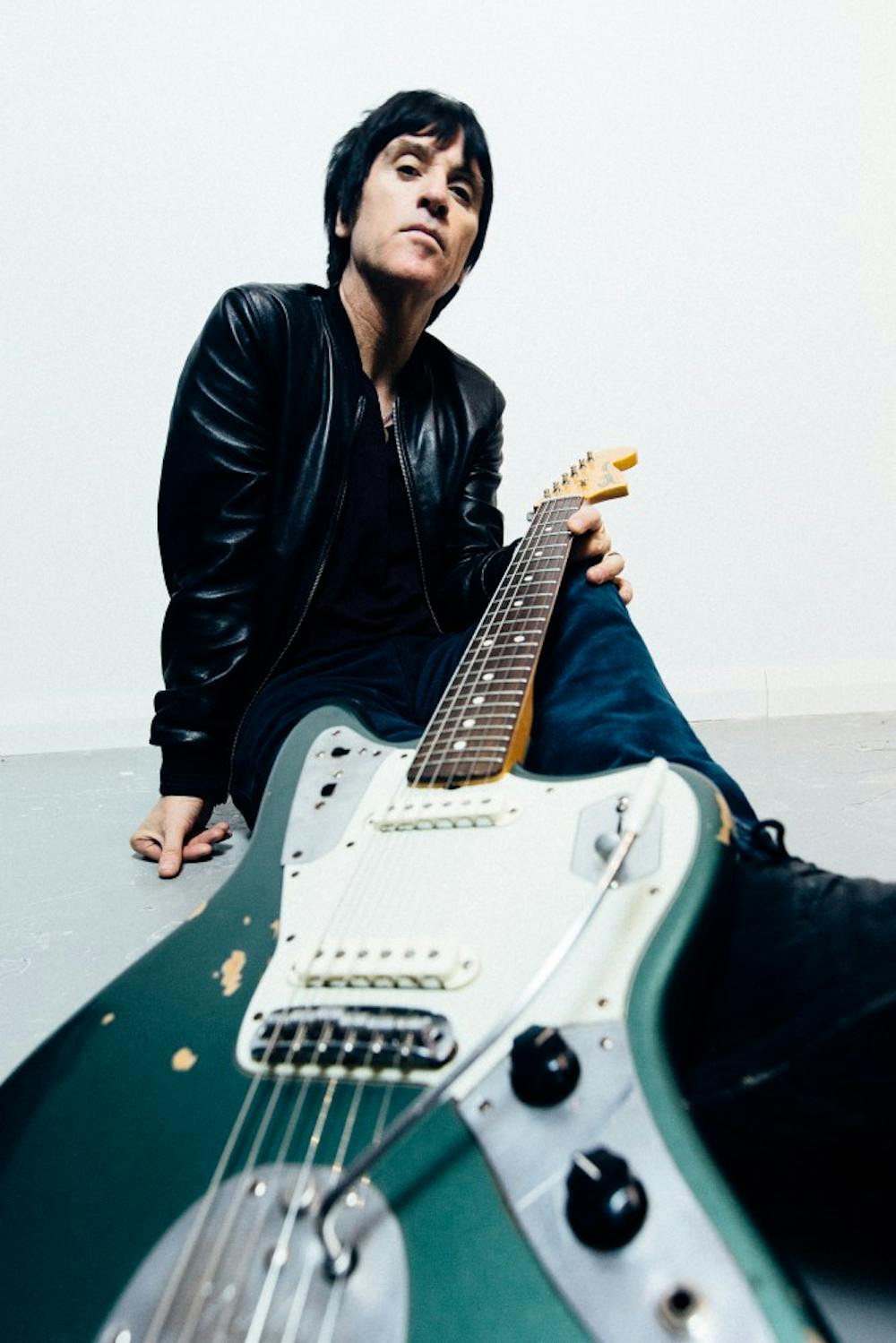Johnny Marr isn’t weary of a change of pace.
Thirty years after the dissolution of the Smiths, Marr went from acts like the Cribs and Modest Mouse to session work. From scoring films like “The Amazing Spider-Man 2” and a collaboration with Hans Zimmer for Christopher Nolan’s “Inception,” Marr finds success in keeping his playing diverse and frequent. Marr recently released his third solo album, “Call the Comet,” his most audacious and politically driven work yet that shows the guitarist has no intention of slowing down.
Ahead of his Oct. 20 Town Ballroom show, The Spectrum spoke with the legendary guitarist to discuss his body of work, influences and his future.
Q:“Call the Comet” presents a slew of political overtones coupled with a diverse set of songs. Did you find yourself writing from the perspective of a collective people’s mindset, or was the process more personal?
A: Well, to be honest, I thought it reflected my own personal views entirely. I was actually trying my hardest to avoid alluding directly to the current melase in modern society and certainly tried to avoid politics all together. I made the record mostly as an escape and also because it’s what I do and it was time to make a record. I think you can’t help reflect what most people are thinking. A lot of people are on the same page. I honestly really wanted to not make a record that felt too directly political ... I didn’t think that figures involved in the political scene deserve to be occupying my creative mindspace. The business of writing songs and doing tracks was really a welcomed escape for me. About five or six songs in, it occured to me that rock music or pop music can be escape. Sure, it’s informative and it can be entertainment and all kinds of things ... I was really happy about chasing that. My end game was that I hoped that when I made a record that people who like what I do could maybe lose themselves in the record for 54 minutes and reconnect with what rock music can do.
Q:There’s a lot of the old and new on “Call the Comet.” You seem to have always maintained a certain demeanor and attitude towards your guitar playing whether it be in a group or as a solo artist.
A: I think there’s a lot of hidden melodies in there. For what I do, the guitar is the start. As more time goes on, that almost feels like a duty to me. If I’m working on a song and a synth line occurs to me or a piano line, more and more now I try to find ways of doing it on the guitar. We’re a guitar band and I’m known for being a guitar player ... it’s certainly an agenda for me. When I was growing up in the ’70s, there were a lot of guys who fronted bands who were cool and played the guitar. There seems to be less of that these days for whatever reasons. I know there’s plenty of guitar bands out there and rock bands out there. I do feel like as more and more time goes on, there’s not many people left who do what I do. I feel an almost weird responsibility to honor the guitar within indie rock. I know there’s plenty of shredding metal dudes out there and rock guys and heritage guys. Pete Townshend is still out there doing things and the Rolling Stones are still out there doing things because those guys love to play. I think for my generation out of the UK, a lot of musicians seem to have fallen away and lost their desire or interest. I’m not only glad that I’m still doing it but that there’s a lot of progress made and frontiers to cross and I feel like there’s a lot songs to write. In that way I don’t feel any different than when I was 16 or how I felt right directly before I formed the Smiths. I’m always pursuing ideas.
Q: Do you think this drive is a result of your influences or something that you think is needed in popular music?
A: I think both to be honest with you. Plus, it’s something that’s been in me from being a little boy. I come from a musical family, a family who was obsessed with records and still are. My parents still go out and see shows and songwriters. I thought from being a little boy that being a musician was the greatest thing in the world. I still feel the same way about that. Almost at this point, because of the way of the world, I feel that we need music more than ever. In my case I guess we’re in a genre and label fixated culture. So lets say what I do is indie rock, or college rock as it was called in the ‘80s. I’m an alternative rock musician and I’m OK with that. I’m fine. I think it’s needed. I think there’s plenty of musicians out there whether it’s Jack White or Broken Social Scene or Arctic Monkeys, the list goes on and on ... there’s plenty of bands out there with great motivation and the right intentions. From the scene that I started out in, there don’t seem to be many people wanting to do it. I’ve always been on a mission and that mission still continues ... I’ve got a great band and I want to get better as a songwriter and a performer.
Q: What differences have you found as a solo artist? Do you find that there is more to be missed or more to be enjoyed?
A: I think there’s more to be enjoyed. There’s more responsibility. Like a lot of things in life, things that are harder work are ultimately more satisfying. In my case, I have the responsibility of running the band and paying other people’s mortgages and that’s cool. I’m a working musician and in this day and age, things have changed a lot since I started. There’s the dreaded social media to tackle, which has its pluses and minuses. It’s a more competitive scene now. When I started out there were these things called records, and they don’t exist particularly anymore ... the obvious things are more rewarding to me. My own songs now, the viewpoint of a song like “A Different Gun” or “The Tracers” or “Day in and Day Out” are my words. That’s more work writing the entire song. Back in the ‘80s and ‘90s, I would put all of my energy and time into creating what were instrumental records. And a singer whether it was Matt Johnson or Morrissey would come and sing their words on top of my backing track. At this point in my life it’s really more satisfying. Going out and singing with my band is really enjoyable. I couldn’t imagine going back and being a sideman in someone’s band now, let’s put it that way. Partly because the business of performing and fronting the band having that relationship with my audience is something that has been amazing ... It’s just been incredible. Me and my audience have got a good thing going and we have an understanding and I take that very seriously. The business of being a performer, without being too high saluting about it or too elevated is very interesting to me. On the one hand, it’s great to be entertaining and see the audience and myself as a good night out of rock music, or sometimes look at it on a whole different level.
Q: You also played on Noel Gallagher’s “Who Built the Moon” this past November. Do you adapt your playing to a specific song, album or artist, or do you strive to do the opposite?
A: Noel was quite surprised because I’ve played on a few of his records now and he was expecting to send me the track. I’ve done so many sessions now that I’ve learned that I’m better when I react to the track straight away. He was surprised when I told him not to send me the track. I didn’t want to hear it before I played. It’s a bit like walking on the wire, you’re asking to screw up. My first impression is usually the right way to go... I always try to do what’s appropriate to the record. But over the years I’ve learned people want me to sound like me. I try to react to the record within my sound. I’m comfortable now with the reality that people get me in there for a reason. I try to live up to that ad bring it whilst not showboating. That’s something that comes with maturity and confidence and being okay with who you are. I have to thank people like Pet Shop Boys for giving me the opportunity to play on so many of their songs and explore different kinds of pop music. I’m at that place in my career now where I’m not too shy about it. You should know it’s me playing.
Brian Evans is the senior arts editor and can be reached at brian.evans@ubspectrum.com and @BrianEvansSpec.
Brian Evans is a senior English major and The Spectrum's senior arts editor.






